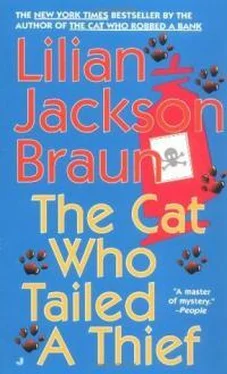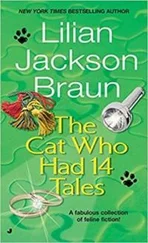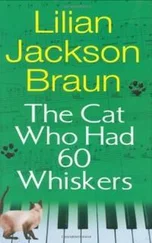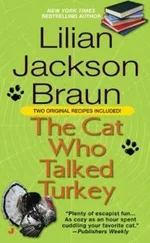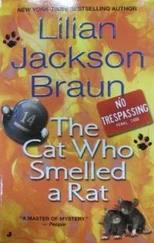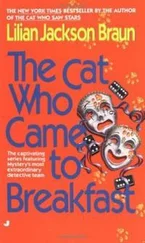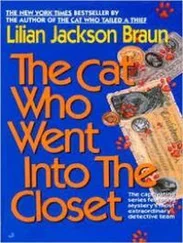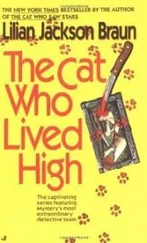Лилиан Браун - The Cat Who Tailed A Thief
Здесь есть возможность читать онлайн «Лилиан Браун - The Cat Who Tailed A Thief» весь текст электронной книги совершенно бесплатно (целиком полную версию без сокращений). В некоторых случаях можно слушать аудио, скачать через торрент в формате fb2 и присутствует краткое содержание. Год выпуска: 2011, Жанр: Детектив, на английском языке. Описание произведения, (предисловие) а так же отзывы посетителей доступны на портале библиотеки ЛибКат.
- Название:The Cat Who Tailed A Thief
- Автор:
- Жанр:
- Год:2011
- ISBN:нет данных
- Рейтинг книги:3 / 5. Голосов: 1
-
Избранное:Добавить в избранное
- Отзывы:
-
Ваша оценка:
- 60
- 1
- 2
- 3
- 4
- 5
The Cat Who Tailed A Thief: краткое содержание, описание и аннотация
Предлагаем к чтению аннотацию, описание, краткое содержание или предисловие (зависит от того, что написал сам автор книги «The Cat Who Tailed A Thief»). Если вы не нашли необходимую информацию о книге — напишите в комментариях, мы постараемся отыскать её.
prizewinning reporter Jim
Qwilleran—along with his
lovable Siamese cats Koko and
Yum Yum—solve a mystery that
arises when a local banker dies under suspicious circumstances,
leaving behind a flashy young
widow, an unfinished house-
restoration project, and a trail of
clues as elusive as a cat burglar
in the night . . .
The Cat Who Tailed A Thief — читать онлайн бесплатно полную книгу (весь текст) целиком
Ниже представлен текст книги, разбитый по страницам. Система сохранения места последней прочитанной страницы, позволяет с удобством читать онлайн бесплатно книгу «The Cat Who Tailed A Thief», без необходимости каждый раз заново искать на чём Вы остановились. Поставьте закладку, и сможете в любой момент перейти на страницу, на которой закончили чтение.
Интервал:
Закладка:
"Wear it to Scottish Night, Qwill. There'll be twenty or thirty fellas in kilts there, and you'll feel right at home. I'll lend you a knife to wear in your sock. You have to have a knife in your sock to be proper."
"Isn't it considered a concealed weapon?"
"Well, Andy Brodie wears one to Scottish Night, and he never got arrested. When you go in, you show it to the doorman, that's all. Wait a second." MacMurchie disappeared and returned with a stag-horn-handled knife in a scabbard. "You borrow this, Qwill. It's lucky to wear something borrowed."
Qwilleran accepted, saying it was a good-looking knife.
"It's called a d-u-b-h, but it's a pronounced thoob."
They said good-bye. Qwilleran told Cody she was a good dog. He and his photographer drove away from Pleasant Street.
"That was cool," Clayton said.
"How'd you like to stop at the Olde Tyme Soda Fountain for a sundae?"
It was a new addition to downtown Pickax, part of the revitalization sponsored by the K Fund. A light, bright shop with walls and floor of vanilla white, it had small round tables and a long fountain bar in chocolate-colored marble. Customers sat on "ice cream" chairs or high stools of twisted wire, with strawberry red seats. Sundaes were called college ices; sodas were called phosphates; banana splits remained banana splits. That was Clayton's choice. Qwilleran had a double scoop of coffee ice cream. Everything was served in old- style ice cream dishes of thick molded glass.
"Did you shoot the whole roll?" Qwilleran asked.
"No, I've got a few exposures left,
I'm leaving tomorrow, so I'll send you the prints. I hate to go. Grandma's a lotta fun."
"Did you get a look at the people from the bank?"
"Yeah, he was okay, but she was weird."
"In what way?"
"I don't know. Just weird. Her voice - it sounded kind of electronic."
An apt description of Danielle Carmichael, Qwilleran thought. "What were they doing?"
"He was walking around and measuring things and talking, and she was writing down what he said. I turned on my recorder. Want me to send a transcript when I get home?"
"Good idea! Did you enjoy your holiday?"
"Yeah, lotsa fun, lotsa food. Grandma remembered all my favorites. Do you think she'll marry Mr. O'Dell?"
"I don't know. Both have a very positive attitude. They both like to help people. They might make a good match."
Clayton was lost for a while in deep thought as he tackled the complexities of a banana split.
Then Qwilleran questioned him about life on the farm. It was a poultry factory. There were no farm animals, just watchdogs, and barn cats, but no indoor pets. Clayton had a stepmother who wouldn't allow animals in the house.
"I'd like to come up here and live with Grandma and go to Pickax High School. It's cool!" he said. "My stepmother wouldn't mind, but my dad doesn't want me to."
As they pulled into Celia's parking lot, Clayton said, "Thanks a lot, Chief. It was cool."
When Qwilleran returned home, he noticed heavy vehicle tracks and large footprints in the recently fallen snow around his condo, but he was not alarmed. It meant that some long-awaited furniture had been delivered. Fran Brodie, who knew his likes and dislikes, had been able to supply the basics for his condo, but additional items were straggling in. She had bought certain items of old pine farm furniture, almost contemporary in its simplicity, and had stripped the finish to a honey color. A light interior was a good choice for a building nestled in the woods. The walls were off-white, and honey was the color of the pine woodwork.
Qwilleran's unite had a lofty living room with large windows overlooking the river. On the opposite wall was a balcony with two bedrooms, and below it were the kitchen and dining alcove. He would use the alcove as an office, and he needed a table or desk surface large enough for typewriter, lamp, papers, books, files, and two supervisory cats.
On this day, as soon as he unlocked the door, Koko notified him that something had been added, yowling and running back and forth to the office alcove. The writing table was indeed large, and it had character. One could imagine that families had been fed on its ample surface, bread had been kneaded, tomatoes had been canned, babies had been bathed, sheets had been ironed, and letters had been written to loved ones during the Spanish American War. There was also a huge stripped-pine cupboard with open shelves above and cabinet below.
Qwilleran lost no time in loading the shelves with books recently purchased or brought from the barn. One shelf he reserved for the Melville set, volumes one to twelve, numbered in chronological order: Typee; Omoo; Mardi; Redburn; White-Jacket; Moby-Dick; Pierre; The Piazza Tales; Israel Potter; The Confidence-Man; Billy Budd; and Weeds and Wildings, the last being a book of poems. He could hardly believe his good fortune.
Koko was impressed, too. During the evening, when it was time for another reading from The Old Wives; Tale, only one cat reported. Koko was curled up on the shelf with the leather-bound volumes. Had he become a literary critic? Was he saying that Melville was a better writer than Bennett?
-5-
On the last day of the year it snowed as usual, and high winds were predicted. Wetherby Goode advised New Year's Eve celebrants to stay off the highways if possible. Then blow ye winds, heigh-ho! was his quotation for the day.
In Indian Village it was customary for neighbors to celebrate with neighbors, and there were numerous at- home parties. For those who liked elbow- to-elbow conviviality, there was a late- night get-together at the clubhouse: light supper, champagne at midnight, no paper hats, no noisemakers. Earlier, Qwilleran and Polly and two other couples would dine with the Exbridges. Don Exbridge, the X in XYZ Enterprises, was the developer responsible for Indian Village, and he and his new wife lived in Building One. They had a double unit, said to be quite posh, with gold faucets and all that. Qwilleran wondered if the Exbridges' windows rattled when the wind blew, heigh-ho, as they did in Building Five. He wondered if the floors bounced like trampolines, and if the Exbridges could hear the plumbing next door. He enjoyed a recurring fantasy: The K Fund would buy Indian Village - the only planned, upscale community in the county - then tear it down and build it right.
The Exbridges proved to be charming hosts, and the dinner was excellent. They had a cook and houseman in addition to gold faucets. Qwilleran kept his ear tuned to the fenestration, but there was no rattle even when the wind swayed the trees frighteningly. As for the floors, they were hardwood with Oriental rugs - not plywood with wall-to-wall carpet. The plumbing was discreetly quiet.
There was much conversation about the theft of the bridge club's money. The new clubhouse manager, Lenny Inchpot, had been questioned by the police; the money jar was kept in a cabinet in his office. Also questioned were the officers of the clubhouse association and the maintenance crew of the building. All agreed there was too much casual traffic in and out. The premises were available for rental, and there were catered parties, lectures, classes, art exhibits, and the like. There was a TV lounge, and there was a room with exercise equipment. Anyone could walk in and watch a soap opera or pump a little iron. There was even a cash bar during certain hours. Locking doors and issuing keys to members would be the first move.
When the time came to ring in the New Year, scores of residents converged on the clubhouse. The main hall had the air of ski lodge, with a lofty wood-paneled ceiling, exposed beams, and a big stone fireplace. Windows overlooked the floodlighted woods, enchanting in winter white. Indoor trees and baskets of ferns, with all the green perfection of plastic, were banked in corners. Silver letters were strung across the chimney breast spelling H-A-P-P-Y N-E-W Y-E-A-R.
Читать дальшеИнтервал:
Закладка:
Похожие книги на «The Cat Who Tailed A Thief»
Представляем Вашему вниманию похожие книги на «The Cat Who Tailed A Thief» списком для выбора. Мы отобрали схожую по названию и смыслу литературу в надежде предоставить читателям больше вариантов отыскать новые, интересные, ещё непрочитанные произведения.
Обсуждение, отзывы о книге «The Cat Who Tailed A Thief» и просто собственные мнения читателей. Оставьте ваши комментарии, напишите, что Вы думаете о произведении, его смысле или главных героях. Укажите что конкретно понравилось, а что нет, и почему Вы так считаете.
